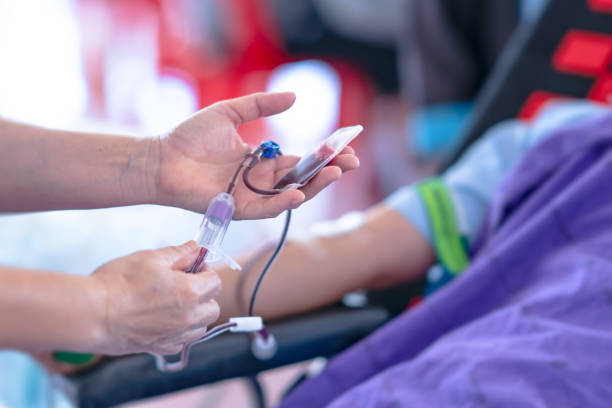Does It Hurt to Donate Plasma?
Plasma donation is an essential process that contributes significantly to the medical and healthcare industries. Plasma, the liquid component of blood, contains important proteins and antibodies used to treat various conditions, including immune deficiencies, bleeding disorders, and burns. Given its importance, many people wonder about the experience of donating plasma, particularly whether it hurts.
Understanding Plasma Donation
Before diving into the sensations associated with plasma donation, it's important to understand what the process entails. Plasma donation, also known as plasmapheresis, involves the extraction of plasma from the blood. The procedure typically takes between 60 to 90 minutes and is carried out at specialized donation centers equipped with the necessary medical infrastructure.
During the donation, a needle is inserted into a vein, usually in the arm, and blood is drawn out. This blood then passes through a machine that separates the plasma from other blood components. The plasma is collected, and the remaining blood components, such as red blood cells and platelets, are returned to the donor's body through the same needle.
Initial Sensations and Discomfort
The first step of plasma donation involves the insertion of a needle into the vein. For many, this is the most concerning part of the process. The sensation of the needle piercing the skin can be described as a quick pinch or sting. This discomfort is typically brief and subsides once the needle is securely in place.
For individuals who are apprehensive about needles, this initial sensation can be a source of anxiety. However, the staff at donation centers are trained to ensure that the procedure is as comfortable as possible. They use sterile, single-use needles and employ techniques to minimize pain and discomfort.
Sensations During the Donation Process
Once the needle is in place and the blood starts to flow, the discomfort often diminishes. The sensation of blood being drawn can feel like a slight pressure in the arm. As the blood passes through the machine and plasma is separated, most donors report feeling little to no discomfort.
The return of blood components to the body can produce a unique sensation. Some donors describe it as a cool feeling, as the blood is mixed with an anticoagulant solution to prevent clotting and may be slightly cooler than the body's temperature. This sensation is generally not painful and can even feel refreshing to some.
Potential Discomfort and Side Effects
While plasma donation is generally well-tolerated, there are potential side effects and discomforts that donors may experience. Some of these include:
- Bruising or Soreness: After the needle is removed, some donors may experience bruising or soreness at the needle site. This is a common occurrence with any procedure involving needles and typically resolves within a few days.
- Dizziness or Lightheadedness: Because plasma donation involves the removal of a component of the blood, some donors may feel lightheaded or dizzy during or after the donation. This is usually temporary and can be mitigated by lying down, staying hydrated, and having a snack after donating.
- Fatigue: The body works to replace the donated plasma, which can lead to feelings of tiredness. Most donors recover quickly, but it's advisable to rest and avoid strenuous activities immediately after donating.
- Calcium Depletion: The anticoagulant used in the plasma separation process can bind to calcium in the blood, leading to a temporary drop in calcium levels. This can cause tingling sensations in the lips, fingers, or toes. Donors are often given calcium supplements if this occurs.
Psychological Aspects of Plasma Donation
The psychological experience of plasma donation can vary widely among individuals. For some, the knowledge that they are contributing to life-saving treatments can provide a significant emotional boost. The act of giving back to the community and helping those in need often outweighs any physical discomfort.
Conversely, individuals with a fear of needles or medical procedures may find the experience more challenging. It is important for these individuals to communicate their concerns with the donation center staff, who can provide reassurance and support throughout the process.
Benefits of Plasma Donation
Understanding the benefits of plasma donation can also impact the perception of pain and discomfort. Plasma donations are crucial for creating therapies for patients with chronic conditions and life-threatening illnesses. Knowing that a single plasma donation can help multiple patients can provide a sense of purpose and fulfillment.
Additionally, regular plasma donors often report a sense of routine and familiarity with the process, which can reduce anxiety and discomfort over time. As donors become accustomed to the sensations and procedures, their overall experience tends to improve.
Tips for a Comfortable Donation Experience
There are several steps donors can take to ensure a more comfortable and positive donation experience:
- Stay Hydrated: Drinking plenty of water before and after donating helps maintain blood volume and reduces the risk of dizziness.
- Eat Well: Having a balanced meal before donating ensures that the body has sufficient nutrients and energy.
- Relaxation Techniques: Practicing deep breathing, listening to music, or engaging in visualization techniques can help reduce anxiety.
- Communication: Informing the staff of any discomfort or concerns allows them to provide immediate assistance and adjustments.
Conclusion
While the prospect of donating plasma may raise concerns about pain and discomfort, the actual experience is often manageable and varies from person to person. The initial needle insertion may cause brief discomfort, but most donors find the remainder of the process to be relatively painless. Any minor side effects, such as bruising or lightheadedness, are typically temporary and can be mitigated with proper care.
The psychological benefits and the knowledge that plasma donation plays a vital role in saving lives can also enhance the overall experience. By understanding the process, communicating with medical staff, and taking steps to ensure comfort, donors can contribute to this important cause with confidence and minimal discomfort.




